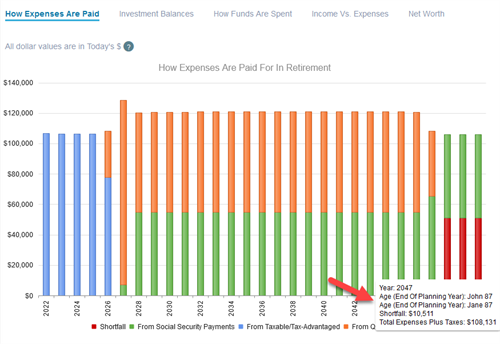Key Points:
- Life expectancy is a very important assumption in a retirement plan. But most people don't know how to estimate it.
- Too many people underestimate their life expectancy.
- The life expectancy numbers most people use are flawed. They are an average of everybody who dies, including the very young.
Most people have several goals in retirement. They want to retire at a certain age, they want to buy a vacation home, a new car, go to Europe twice a year, etc. It’s great to have goals for the retirement years. But I believe too many people skip over the most important goal of them all: Don’t run out of money!
More than half of all baby boomers fear running out of money in retirement more than they fear death. This is according to a study from Allianz Life. Yet nearly 36% of these same people do not know how long their funds will last once they do retire. So even though they’re aware that running out of money would be a complete disaster, many of them haven’t done much about it or put together a plan that helps them ensure a secure retirement.
Problems With Life Expectancy Numbers
Making matters even more confusing, many of those approaching retirement simply assume they won’t live much past their quoted life expectancy. But there is a big problem when looking at life expectancies: they go up as a person survives another year. For example, a white male born in 1960 had a life expectancy of 68 at birth. However, by age 40 his life expectancy was 72 and if he makes it to age 70 his life expectancy will be 80. Perhaps more interesting is this: 20% of males and 32% of females who make it to age 65 today will live to age 90!
There are clearly problems with using life expectancy when attempting to figure out how much money you will need in retirement. The first is that as you make it another year, your life expectancy goes up. This makes sense because you’ve survived and by definition you’ve beaten out some of the others. Life expectancy is an average number and suffers from survivor bias.
Another problem is assuming that living to age 90 is so difficult, when it isn’t as rare as most people think. Vanguard has a very nice free calculator that shows the probabilities of living to a certain age given some basic information.
So what are people to do if they can’t assume they’ll be gone by age 90? The responsible thing to do is to plan on having money to at least age 95 and possibly 100 years old. The real question is, how can that be done?
Life Expectancy Scenarios
Let’s take a typical couple that is 50 years old and has found out from their financial planner that, given their expected expenses and current investment values, they will likely run out of money in retirement by age 87.

I ran some scenarios using my company’s retirement planner to come up with some solutions. Some of the assumptions are as follows:
| Inflation (CPI) | 3.0% |
| Retirement Age | 62 |
| Social Security at age 65 (combined) | $25,000 per year |
| Average Savings Rate | 4% |
| Total Investment Balance Today | $400,000 |
| Recurring Annual Expenses in Retirement | $45,000 |
| Investment Mix | 50% Equities 50% Short-Term Treasuries |
| Return Assumption Equities | 6% per year |
| Return Assumption Treasuries | 0.5% per year |
Right away we can see a huge part of the problem is that 50% of this couple’s portfolio is well below the rate of inflation. Inflation can simply ruin a portfolio’s value over time. It is so important to at least break even with inflation. So I moved the 50% of short-term treasury funds into a combination of Treasury-Inflation Protected Securities (TIP) and a portfolio of solid dividend paying stocks with a history of consistent dividend growth, such as Johnson & Johnson (JNJ), Procter & Gamble (PG), Coca-Cola (KO), and Wal-Mart (WMT).
After running these scenarios I found the following: by just beating inflation by 1% per year, this couple can extend their funds by 4 years, until age 91. Then by moving their retirement age to a more realistic age 64, funds are extended another 6 years to age 97.
What to do if You're Projected to Run out of Money
There are many ways to push out funds in retirement, especially if the person or couple has at least a decade before they retire. Beating inflation should be one of the first goals people have when planning for retirement. After that they can look at pushing out the age when they retire, cutting back on expenses, and optimizing social security payments by delaying when their first payment occurs. Regardless of the way funds are preserved longer in retirement, one thing is clear. It is very dangerous to use average life expectancies when planning for retirement. Those approaching retirement will be much better prepared if they assume they will to at least age 95.